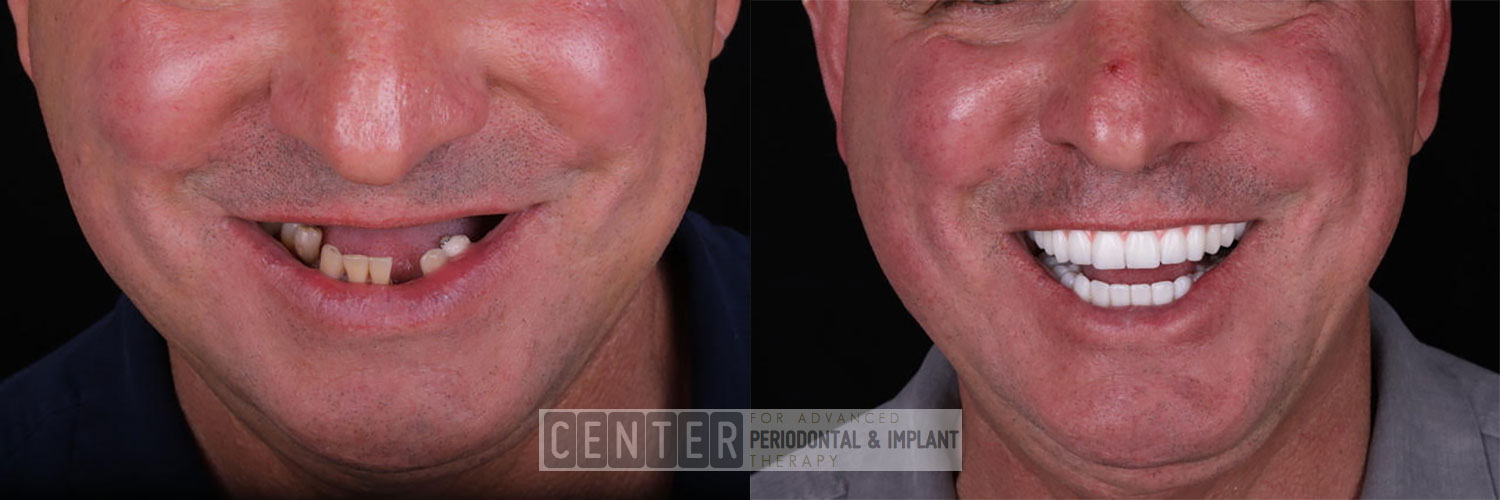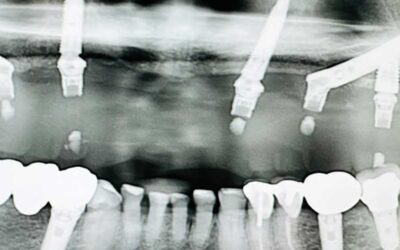Implants More Successful with a Seasoned Periodontist
Dental implants can provide a great alternative to traditional bridges or dentures for tooth restoration. However, not all dental implants are successful. Although implants offer numerous benefits over older forms of tooth restoration, recent evidence suggests that various factors, including the surgeon’s experience level, significantly affect the procedure’s outcome.
The Importance of Experience in Dental Implant Success
According to a new study from the Journal of Oral Implantology, the success of dental implants is at least partially determined by the number of surgeries the periodontist has previously performed. The study indicates a statistical difference in implant success rates between trained and novice dentists. Experienced periodontists are more likely to anticipate potential complications and manage them effectively, leading to higher success rates.
Implant Therapy in Los Angeles
When choosing a periodontist for dental implants, it’s important to consider the doctor’s educational background and practical experience. Dentists who have participated in only weekend and continuing education courses may not possess the same expertise as periodontists who have completed comprehensive three-year post-graduate programs. Choosing a skilled periodontist can help ensure that your implants are successful.
Dr. Alexandre Aalam and Dr. Alina Krivitsky are the only two board-certified periodontists in the Brentwood area and are highly experienced in dental implants. Both doctors completed USC’s prestigious certificate in Advanced Periodontology and Implantology and are widely regarded as specialists in the field, regularly speaking and publishing about the subject.
Training and Expertise of Periodontists in Dental Implants
Periodontists undergo extensive training, making them uniquely qualified for placing dental implants. Here’s why their expertise matters:
- Advanced Education – Periodontists complete three additional years of post-dental school education focused on the supporting structures of teeth, such as gums and bone. This comprehensive training equips them with specialized knowledge and skills not typically covered in general dentistry programs.
- Expertise in Gum Health – Periodontists’ in-depth understanding of gum health is crucial during implant procedures. Healthy gum tissue is essential for the successful integration and longevity of dental implants. Their ability to diagnose and treat gum diseases ensures the best possible outcomes for patients.
- Mastery in Bone Regeneration – Periodontists are skilled in bone grafting techniques, which are often necessary for patients with insufficient bone density. This expertise allows them to create a stable foundation for implants, increasing the success rate of the procedures.
- Precision and Skill – Their rigorous training and practical experience enable periodontists to place implants with high precision, minimizing complications and ensuring a higher success rate. They are adept at managing the complexities of implant surgery, which can be challenging for less specialized practitioners.
Why Choose a Periodontist for Dental Implants
Choosing a periodontist for dental implants ensures a high level of care due to their specialized training in both dental implants and gum health. Here’s why periodontists are often the better choice:
- Specialized Knowledge – Their in-depth understanding of gum and bone health ensures that the implant is supported by healthy tissues, which is crucial for the long-term success of the implant.
- Advanced Techniques – Periodontists are trained in the latest surgical techniques and use cutting-edge technology to place implants with precision.
- Holistic Approach – They focus on the overall health of the mouth, ensuring that the surrounding gum and bone tissues are healthy and capable of supporting the implant.
By choosing a periodontist, patients benefit from a professional who combines surgical expertise with a deep understanding of the supporting structures of teeth, leading to more successful and lasting outcomes for dental implants.

Benefits of Dental Implants
Because they involve replacement tooth roots, implants offer a stronger foundation for new teeth. Dental implants fuse to the bone, making teeth less likely to move around in the mouth and cause problems with eating and speech. Since implants look and feel more like your own teeth, they tend to raise self-esteem more than traditional dentures. Implants are also more durable and longer-lasting than other forms of restoration. Overall, researchers have declared the success rate for implant-supported fixed dentures to be 90%.
History and Evolution of Dental Implants
The concept of dental implants is not new; ancient civilizations attempted various forms of tooth replacement. However, modern dental implantology began in the 1950s with the pioneering work of Dr. Per-Ingvar Brånemark, who discovered that titanium could successfully bond with bone. This breakthrough led to the development of the first modern dental implants. Since then, advancements in materials, techniques, and technology have significantly improved the success rates and functionality of dental implants.
Candidate Requirements for Dental Implants
To be a suitable candidate for dental implants, patients need to have healthy gums and sufficient bone density to support the implant. The success of the implant heavily relies on these factors. However, certain medical conditions can negatively impact the success rates of dental implants.
Health Considerations
- Healthy Gums: Gums free from periodontal disease are essential for supporting the implant.
- Sufficient Bone Density: Adequate bone is necessary to anchor the implant securely. If bone loss has occurred, bone grafting procedures may be required.
Medical Conditions Impacting Success Rates
- Diabetes: According to studies, diabetes can impair healing and osseointegration, leading to a higher failure rate. Approximately 28% of patients with diabetes have experienced implant failure.
- Bruxism (Tooth Grinding): Chronic tooth grinding exerts excessive pressure on the implants, which can cause failure. Around 29% of patients with bruxism have reported implant failure.
- Smoking: Smoking can impede healing and increase the risk of infection, significantly lowering the success rate of dental implants.
- Autoimmune Diseases: Conditions such as rheumatoid arthritis or lupus can interfere with healing and osseointegration.
- Medications: Certain medications, especially those affecting bone metabolism (e.g., bisphosphonates), can negatively impact implant success.
Additional Factors
- Age: While there is no age limit, older patients may face more challenges due to bone density loss and slower healing rates.
- Oral Hygiene: Commitment to excellent oral hygiene practices is crucial for the long-term success of dental implants.
Pre-Surgical Evaluations
- Comprehensive Dental Examination: Includes dental X-rays and 3D images to assess the bone and gum health.
- Medical History Review: To identify any conditions or medications that might affect the procedure.
- Treatment Planning: Customized plans that address the patient’s specific needs and health conditions, ensuring the highest chance of success.
By thoroughly evaluating these factors and addressing any potential issues beforehand, periodontists can significantly increase the likelihood of successful dental implant outcomes.
Advanced Techniques and Technologies in Implant Dentistry
The field of implant dentistry is continually evolving, with new techniques and technologies improving outcomes. Advanced imaging techniques, such as 3D cone beam computed tomography (CBCT), allow for precise planning and placement of implants. Computer-guided surgery can enhance accuracy and reduce the risk of complications. Innovations in implant materials and surface treatments also contribute to higher success rates and faster osseointegration.
Zirconia Dental Implants
In addition to traditional titanium implants, we offer Zirconia dental implants, a holistic alternative known for their biocompatibility and aesthetic benefits. Zirconia implants are ceramic and white, making them more visually appealing as they blend seamlessly with natural teeth. They do not corrode over time, ensuring long-term safety and durability without emitting metal particles into the body. This makes them ideal for patients with metal allergies or those seeking a more natural option. Zirconia implants provide the same strength and stability as titanium implants while offering enhanced aesthetics and a holistic approach to dental health. Learn more about Zirconia dental implants and their benefits.
Comprehensive Care at the Center for Advanced Periodontal and Implant Therapy
At the Center for Advanced Periodontal and Implant Therapy, we offer a comprehensive approach to dental implant therapy. From initial consultation and planning to the final placement and follow-up care, our team ensures that every patient receives personalized attention and treatment tailored to their needs. Our state-of-the-art facility and commitment to continuous education and training allow us to provide the highest standard of care.
Improving Quality of Life with Dental Implants
Dental implants can be a highly effective means of restoring missing teeth, offering less treatment time and faster healing than other forms of dental restoration, along with more durable, natural-looking teeth.
Restoring Functionality
Healthy dentition significantly enhances your ability to chew and speak effectively. Missing teeth can lead to difficulties in these basic functions, affecting your diet and communication.
Preventing Further Oral Health Issues
Gaps left by missing teeth can cause periodontal disease and infections. Dental implants help prevent bone loss and maintain the structure of your jaw, reducing the risk of future dental issues.
Enhancing Aesthetics and Confidence
Since implants look and feel more like natural teeth, they boost self-esteem more than traditional dentures. Patients often report feeling more confident in social and professional settings.
Long-Term Durability
Implants are more durable and longer-lasting than other forms of restoration. With proper care, they can last a lifetime, providing a stable and permanent solution to tooth loss.
Comfort and Convenience
Unlike removable dentures, dental implants eliminate the discomfort and inconvenience of dealing with adhesive and cleaning routines. They become a permanent part of your mouth, functioning like natural teeth.
Improved Oral Hygiene
Implants do not require reducing other teeth, as a tooth-supported bridge does. Because nearby teeth are not altered to support the implant, more of your own teeth are left intact, improving long-term oral health.
By opting for dental implants, patients can enjoy a significant improvement in their overall quality of life, making this restorative procedure a worthwhile investment for long-term health and well-being.
Potential Risks and Complications
While dental implants have a high success rate, they are not without risks. Potential complications include infection at the implant site, injury or damage to surrounding structures such as teeth or blood vessels, nerve damage, and sinus problems when implants are placed in the upper jaw. However, these risks can be minimized by choosing an experienced and skilled periodontist who follows best practices and uses advanced technology. At our Center, we are committed to elevating dental implant standards to ensure patient safety and optimal outcomes.
Contact Dr. Aalam and Dr. Krivitsky
If you’re considering dental implants, it is important to consider the experience level of your periodontist. For more information about dental implants and other implant therapy in Los Angeles, or to schedule a consultation with Dr. Aalam or Dr. Krivitsky, please feel free to call us at (424) 378-0567
You May Also Like...
How Much Do Dental Implants Cost in Southern California? A Complete Guide
If you're considering dental implants in Southern California, you’re likely wondering: How much will they cost? Are...
Can Zygomatic and Pterygoid Implants Be Done in a Day? Breaking Down the Process
Losing bone in the upper jaw can feel overwhelming, especially if you've been told traditional implants aren’t an...
Are Dental Implants Noticeable?
If you've lost one or more teeth due to periodontal disease, trauma, or other dental issues, you might be considering...



